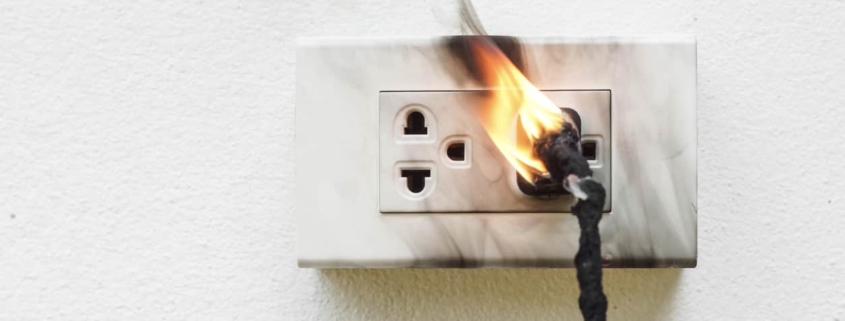You’re sitting at your breakfast table enjoying a fresh cup of coffee when you notice an acrid smell drifting across the room. Your pancakes, cooked to perfection, sit in front of you. You definitely remember turning off the stove. But the odor grows stronger. You peek into your kitchen to see your coffee maker sparking and a roving flame traveling its way up a nearby wall.
Breakfast will go forgotten in the face of a dangerous electrical fire. What do you do when an appliance causes a fire? And how do electrical fires start in the first place?
When Dealing With an Electrical Fire:
Do Not Use Water
Water conducts electricity, so using it on an electrical fire may cause electric shock. Use a fire extinguisher. If you do not have a fire extinguisher, you can try to smother the flame — if small — with a blanket or baking soda. Do not use other powdered products like flour, as they may be flammable and make the fire worse.
If you can unplug or power down the source of the fire, do so.
If the fire is larger than you feel comfortable dealing with or continues despite your efforts, close all access to the area to slow the flow of oxygen.
Call Fire Authorities
As you dial 911 and alert the authorities, alert any other occupants so they stay clear of the area. If smoke or flames increase and it is difficult to breathe, vacate the building immediately.
Electrical fires are incredibly dangerous, so don’t underestimate them or their severity.
How do electrical fires start?
A malfunctioning product or electric source can cause an electrical fire. Electrical fires caused by malfunctioning products may open the manufacturer and other parties to a product liability lawsuit.
The Consumer Product Safety Commission says that major appliances cause about 150,000 electrical fires each year. About half of those electrical fires are caused by malfunctions in the appliances or wiring, according to Consumer Reports. Most are caused by cooking ranges, clothing dryers, air conditioners, refrigerators, and dishwashers.
The age of an appliance as well as the load placed on it and its electrical outlet all contribute to the risk of a potential electrical fire.
Other causes of electrical fires can be traced to frayed product electrical cords, running product cords under rugs, lamps and lights with lightbulbs that exceed their wattage capabilities, and extension cords. In addition, major appliances should never be plugged into extension cords, especially for prolonged periods of time as the cord can overheat and start a fire.
It’s also important to pay attention to any product recalls. Just last week, a company had to issue a recall for a coffee bean roaster because the product was found to overheat, causing a fire risk. Upon buying a new appliance, its documentation should tell you how to register it. This registration enables companies to reach out to you should there be a sudden recall or product alert. You can also check for recalls at www.recalls.gov.
Electrical Fire Warning Signs
How electrical fires start varies, but there are some general warning signs.
If you notice a burning smell coming from an electrical appliance or outlet, it’s time to turn off the power supply, unplug the appliance, and call an electrician or appliance repair person.
Other warning signs of a possible impending electrical fire include:
- Feeling a buzz or tingle whenever you touch an appliance
- Sparking wall outlets
- Frequent blown fuses or tripped circuit breakers
Circuit breakers are triggered when a circuit is becoming overloaded with electricity. If the breaker fails, the electrical flow could damage the circuit and connecting appliances, potentially causing a fire.
Electrical Fire Safety Tips
Once you know how electrical fires start, take proactive measures to prevent them to the best of your ability.
- Routinely clean and maintain your appliances
- Only one heat-producing appliance should be plugged into an electrical outlet at a time
- Unplug small appliances when not using them
- Keep heat-producing appliances away from flammable or combustible objects or materials
- Do not leave appliances such as dryers or dishwashers running while you sleep
Only 22% of electrical fires involving malfunctioning equipment occur between the hours of midnight and 8 am. But this portion of electrical fires accounts for nearly 60% of electrical fire deaths.
With that in mind, it’s extremely important to ensure that you have working smoke alarms, which can provide you with extra time to call 911 and evacuate if necessary.
What should I do if my appliance caused an electrical fire?
If your appliance caused a fire, you may have grounds for a product liability claim. Such claims arise whenever an appliance was used as intended and instructed but failed to perform its duty safely.
One of the main purposes of the Consumer Product Safety Act of 1972 is to protect people from unreasonable risks of injury associated with consumer products. You should not have to worry about whether your coffee maker will burst into flames when you leave it to brew.
If you’re unsure whether your situation qualifies, contact Lytal, Reiter, Smith, Ivey & Fronrath today for a free consultation with an experienced Florida product liability attorney.




